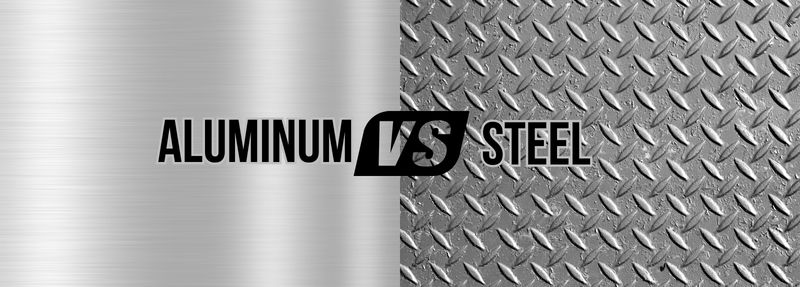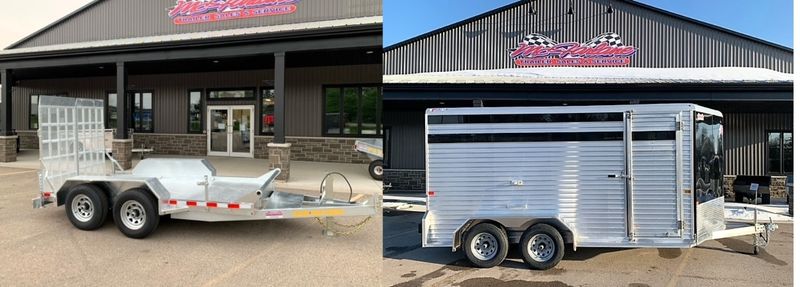 Choosing the right trailer can feel like a big decision, but it all starts with understanding the materials. Are you looking for something lightweight and rust-resistant, or do you need a strong, heavy-duty option? The choice between aluminum vs. steel trailer durability can affect how long your trailer lasts, how it performs on the road, and how much you’ll spend over time. Each material comes with its own set of strengths, so figuring out which one matches your needs is the key to making the right pick.When it comes to weight differences in trailer materials, there’s a lot to consider. Steel trailers are known for their toughness, while aluminum trailers offer convenience and less wear on your vehicle. Our team understands that performance and cost matter just as much as reliability. And if you’re still unsure, the team at McFarlane Trailers in New Hamburg, Ontario, is always here to help.That's why we’ll break down the cost comparison: aluminum and steel trailers, alongside other important factors, to help you decide. Whether you're towing for work or personal use, we’re here to guide you to the best choice.
Choosing the right trailer can feel like a big decision, but it all starts with understanding the materials. Are you looking for something lightweight and rust-resistant, or do you need a strong, heavy-duty option? The choice between aluminum vs. steel trailer durability can affect how long your trailer lasts, how it performs on the road, and how much you’ll spend over time. Each material comes with its own set of strengths, so figuring out which one matches your needs is the key to making the right pick.When it comes to weight differences in trailer materials, there’s a lot to consider. Steel trailers are known for their toughness, while aluminum trailers offer convenience and less wear on your vehicle. Our team understands that performance and cost matter just as much as reliability. And if you’re still unsure, the team at McFarlane Trailers in New Hamburg, Ontario, is always here to help.That's why we’ll break down the cost comparison: aluminum and steel trailers, alongside other important factors, to help you decide. Whether you're towing for work or personal use, we’re here to guide you to the best choice.Durability: Which Trailer Lasts Longer?
One of the most important factors when picking a trailer is how well it stands up to wear and tear. Durability isn’t just about how tough a trailer is—it’s also about how long it lasts and how much care it needs.Steel trailers like the One-Sixteen brand are built for strength. Made with heavy-duty materials, they’re designed to handle rough terrain, heavy equipment, and tough jobs. If you’re hauling bulky or heavy loads, steel can take on the challenge. However, steel needs regular care to stay in top shape. Without proper maintenance, it can rust over time, especially in wet or snowy conditions. Rust prevention, like painting or coating, is a must to keep it from breaking down.Aluminum trailers like the Enbeck brand are naturally resistant to rust and corrosion, which makes them great for harsh weather. Snowy winters or rainy days are no problem for aluminum. While it’s a bit less resistant to impact compared to steel, aluminum still holds up well under normal use. It’s lightweight but tough, offering durability for most jobs, whether it’s hauling tools or towing smaller loads.When choosing between these two materials, think about your work environment. Will the trailer face rough use or wet weather? Each material has benefits to fit those needs.Weight Differences: Which Trailer Is Easier to Haul?
The weight of your trailer doesn’t just affect your vehicle—it can also change your towing experience. Some trailers are heavier and harder to manage, while others make towing easier and more efficient.Steel trailers are heavier, which makes them more stable on the road. This can be helpful when transporting extremely heavy loads. However, the added weight might require a more powerful towing vehicle. If your truck or SUV isn’t prepared for the extra load, you might need to upgrade your vehicle to handle a steel trailer.Aluminum trailers are much lighter, making them easier to tow. A lighter trailer can save fuel and reduce the strain on your vehicle. If you own a smaller car or plan to tow over long distances, aluminum could be the better option. And because they’re lightweight, you may have an easier time hitching and unhitching the trailer.The weight difference between aluminum and steel trailers could have a big impact, so think about what suits your vehicle and how often you’ll need to tow. If you want simple, smooth hauling, aluminum might be your winner.Cost Comparison: Aluminum and Steel Trailers
Cost is always a factor when making a purchase this important. Which trailer gives you the best value over time? Here’s how aluminum and steel compare when it comes to costs.Steel trailers are generally more affordable upfront. This makes them a popular choice for people and businesses looking for a sturdy, budget-friendly option. However, keep in mind that maintaining a steel trailer can increase costs over time. Regular rust prevention, painting, or repairs may be necessary to keep it in good condition.Aluminum trailers usually cost more at the start. But what you spend upfront, you might save later. Since aluminum is resistant to rust, it doesn’t require as much maintenance. Over the long term, aluminum trailers can prove to be a better investment because of their lower upkeep and longer lifespan.When deciding where to spend your money, think about the long-term costs. Steel trailers are cheaper to buy, but aluminum trailers can save you time and money over the years with less maintenance.
Best Trailer for Your Needs
Choosing between aluminum and steel comes down to what you need the trailer for. Each material has strengths that work better in certain situations, so consider the following:- For Heavy-Duty Jobs: If you’re using your trailer for construction, landscaping, or hauling large equipment, steel is your best bet. Its strength and ability to handle heavy loads make it ideal for tough jobs. Steel trailers can withstand intense stress, even on rough roads or demanding worksites, giving you peace of mind for heavier tasks.
- For Easy, Frequent Towing: If your towing needs are lighter or more regular, aluminum is the way to go. Whether it’s personal errands or small business use, aluminum is lightweight and easy to move. Its lighter build not only saves fuel but also makes it easier to hitch up or park when you’re on the go.
- For Tough Weather Conditions: Aluminum trailers excel in harsh weather environments. Resistant to rust, they perform well in snowy winters or rainy climates, so you won’t have to worry about damage or constant repairs. Even after years of exposure to wet or icy conditions, aluminum keeps its sleek appearance and reliability.

